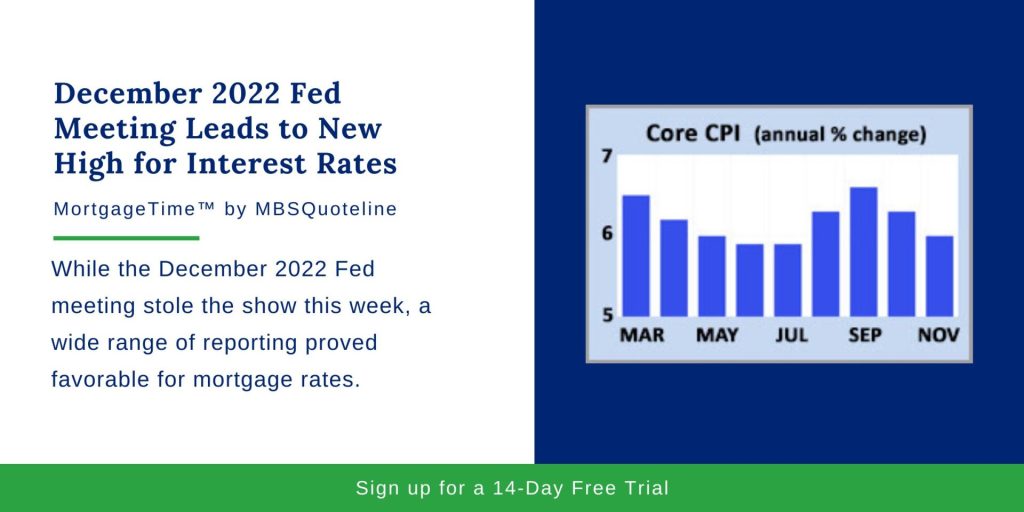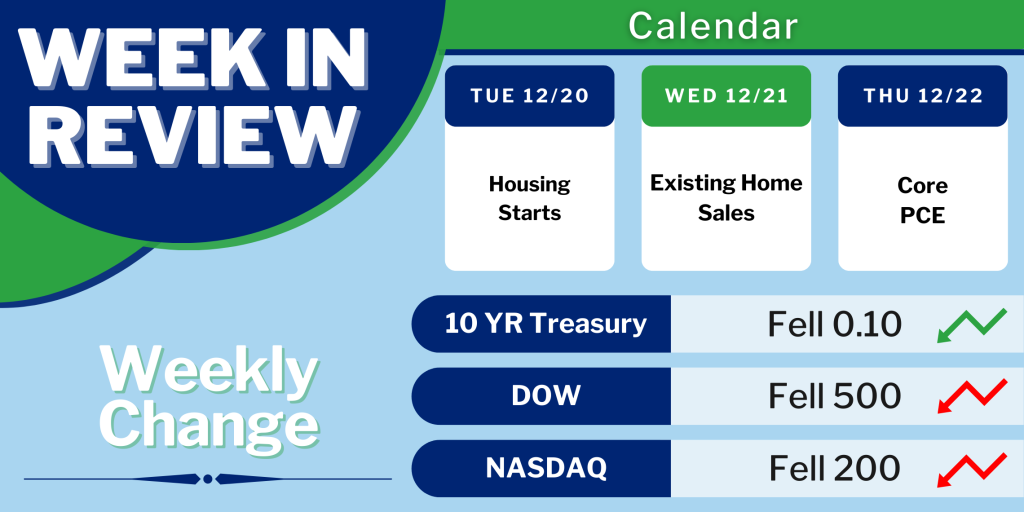While the December 2022 Fed meeting stole the show this week, a wide range of reporting proved favorable for mortgage rates. Keep in mind that slower economic growth and lower inflation generate a positive reaction for the bond market.
First, both the United States Federal Reserve and the European Central Bank announced the expected rate hikes this week. In addition, they emphasized the need for additional tightening. Now, investors potentially expect a higher peak for interest rates.
Also worth noting, the latest inflation data came in lower than expected. Similarly, consumer spending failed to reach its forecasted consensus. As a result, mortgage rates ended the week lower.
December 2022 Fed & ECB Meetings Raise Interest Rates by 50 Basis Points
On Wednesday, the December 2022 Fed meeting saw another interest rate increase. However, the Fed only raised rates by 50 basis points this time around. Now, the target range falls between 4.25% and 4.50%. Thus, interest rates achieved their highest level since December 2007.
Afterward, investors immediately focused on the latest projections from officials. Moreover, investors concentrated on the terminal rate, which increased to 5.10%. Conclusively, this sets a new standard for initial terminal rate of around 4.90% prior to the meeting.
During his press conference, Fed Chair Powell remained firmly committed to fighting inflation. However, he appeared to leave the door open if inflation declines unexpectedly quickly. While noting that it will take “substantially more evidence,” Powell hinted that the Fed would be willing to scale back its monetary policy tightening if the data convincingly indicates that inflation is on a “sustained downward path.” The European Central Bank (ECB) also raised benchmark rates by 50 basis points. Additionally, the ECB delivered a similar message about doing whatever it takes to bring down inflation.
November 2022 CPI and Consumer Spending Miss Their Consensus Forecasts
Aside from the December 2022 Fed meeting, investors closely watch the Consumer Price Index (CPI) for inflation indications. Notably, the CPI report looks at price changes for a broad range of goods and services. Core CPI excludes the volatile food and energy components. Also, Core CPI provides a clearer picture of the longer-term inflation trend.
In November 2022, Core CPI climbed 6.0% from a year ago. Therefore, Core CPI dropped below the consensus forecast, also down from 6.3% last month. Examining the big pictures, inflation remains far above the readings around 2.0% seen early in 2021 (the Fed’s target level).
Meanwhile, consumer spending accounts for over two-thirds of the United States’ economic activity. Thus, consumer spending represents an important indicator of economic health. In November, retail sales fell 0.6% from October, well below the consensus forecast for a decline of just 0.3%. The pullback occurred across industries. Furthermore, furniture stores, building materials, and auto dealers demonstrated particular weaknesses. This report increased investor concerns about a slowdown in shopping due to higher prices and economic uncertainty heading into the crucial holiday season.
Looking Ahead After the December 2022 Fed Meeting
From the point of view of a bond investor, the events this week painted a pleasing picture. Over the last couple months, the annual inflation rate dropped more quickly than expected. In addition, the significant decline in consumer spending suggests slower economic growth. This reduces future inflationary pressures. Finally, the December 2022 Fed meeting and ECB meeting indicate a firm commitment to additional monetary policy tightening in an effort to restrain inflation.
Holistically, investors continued looking for guidance on the magnitude of future rate hikes and bond portfolio reduction. Next week, Housing Starts release on Tuesday. Existing Home Sales come out on Wednesday and New Home Sales publishes on Friday. The core PCE price index, the inflation indicator favored by the Fed, also releases on Friday.
With economic news leading to further recession talk, mortgage rates ended the week higher. Never miss an update with MBSQuoteline. To receive by-the-minute updates on mortgage-backed securities, try our platform free for 14 days.
Stay connected with MBSQuoteline on social media by following us on Facebook, Twitter, and LinkedIn.
All material Copyright © Ress No. 1, LTD (DBA MBSQuoteline) and may not be reproduced without permission. To learn more about the MortgageTime™ newsletter, please contact MBSQuoteline at 800.627.1077 or info@mbsquoteline.com.



